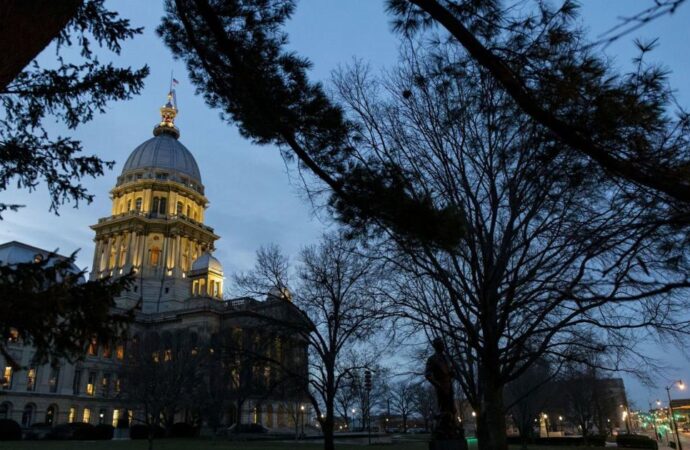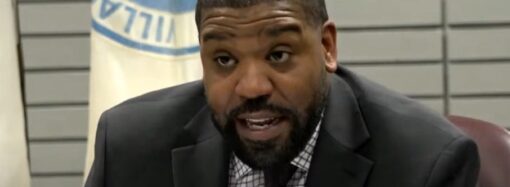Reaction to Pritzker’s budget proposal splits along partisan lines SPRINGFIELD — Central Illinois lawmakers and interest groups gave mixed reaction to Gov. J.B. Pritzker’s $41.58 billion budget proposal Wednesday, but Democrats and Republicans acknowledged the tough choices ahead because of the pandemic. General Assembly Democrats expressed their support for Pritzker’s proposal even while hoping for
Reaction to Pritzker’s budget proposal splits along partisan lines
SPRINGFIELD — Central Illinois lawmakers and interest groups gave mixed reaction to Gov. J.B. Pritzker’s $41.58 billion budget proposal Wednesday, but Democrats and Republicans acknowledged the tough choices ahead because of the pandemic.
General Assembly Democrats expressed their support for Pritzker’s proposal even while hoping for increases to fund state programs. Across the aisle, Republicans said the governor’s budget takes Illinois in the wrong direction as lawmakers work to rebuild the economy this spring.
Republicans are particularly irritated by Pritzker’s proposal to close tax incentives for businesses to help keep revenue up.
“When you’re eliminating incentives to invest and create jobs, that’s basically a tax increase,” said state Rep. Tim Butler, R-Springfield.
“The Illinois Chamber is opposed to the massive tax increase proposed by the governor’s budget plan under the guise of ‘closing corporate loopholes.’ We understand that the state has fiscal problems to address, however, the governor’s plan will have a long-term negative impact on job creation and tax revenues for the state,” said Illinois Chamber of Commerce President Todd Maisch.
“This budget just doesn’t have the visionary approach to position us for success in a post-COVID world,” said state Sen. Chapin Rose, R-Mahomet.
State Rep. Avery Bourne, R-Morrisonville, said Pritzker’s budget relies on “gimmicks” for balancing the state’s $5 billion budget shortfall.
“He presented a budget that unfortunately, but not surprisingly, is out of balance,” Bourne said. “(It’s) only balanced based on (those) gimmicks and a billion dollars of new tax increases on small businesses and job creators. Illinoisians deserve better.
State Rep. Mike Murphy, R-Springfield, said Pritzker’s budget takes away from agreements Republicans worked to achieve with Pritzker in 2019.
“It was very partisan,” Murphy said of Pritzker’s speech, which was critical of Republicans. “He wasn’t talking like that in 2019 when he was asking for our support and we stepped up and took a tough vote for him.”
Murphy was among several Republican lawmakers in 2019 who supported bipartisan legislation, including a capital plan.
Sen. Steve McClure, R-Springfield, said that the proposed budget would be balanced on the backs of taxpayers. Despite this, he was hopeful for common ground with Democrats in the legislature to avoid this.
“I remain hopeful that the General Assembly will be able to work together to put forward a more responsible budget through a transparent process that helps our state grow, gets people back to work, and doesn’t cost us any jobs,” McClure said.
Sen. Sally Turner, R-Beason, said that she wanted more emphasis on speeding up vaccinations and shared McClure’s hope for bipartisan work to create a better budget process.
“I look forward to working with my colleagues on both sides of the aisle,” Turner said. “I’m brand new and I’m looking forward to doing whatever I can to come up with cohesive, solid solutions to problems in our state.”
Pritzker blamed Republicans in his speech for holding up relief over the last year. Butler said Pritzker’s criticism was a “red herring” and Republicans were happy to work with Pritzker and Democrats on the budget.
Rose and Murphy said they wanted to know what happened to cuts to Pritzker asked state agencies to make prior to the pandemic.
Republicans stopped short of saying where they would make cuts to the state’s budget to keep it balanced amid revenue shortfalls, however.
Butler was optimistic, however, about Pritzker’s ask to lawmakers to pass a separate $60 million bill to alleviate problems at the Illinois Department of Employment Security.
“That’s a perfect issue where we can hopefully find common ground on some things that can move something forward to actually benefit people,” Butler said.
On the Democratic side, Rep. Sue Scherer, D-Decatur, said that she wanted to see the vaccine rollout work better for her constituents. She also was looking forward to having money available to open schools within her district.
“Our parents should feel safe and confident that their children can return to school and get their education without worry of the pandemic,” Scherer said. “We have many essential workers who have continually made sacrifice after sacrifice to ensure our communities could still operate during these trying times. We cannot let their efforts go in vain, as legislators, the time is now to make tough decisions in the best interest of the people of Illinois, our workers and those desperate to find a job.”
Sen. Doris Turner, D-Springfield, praised Pritzker’s proposal for bolstering IDES, mental health programs and senior services. While she didn’t think everything was perfect, she said it was a budget that she and her fellow Democrats could work with.
“There are some encouraging aspects of the governor’s proposal, and I look forward to further discussions with him and his team to improve upon it,” Turner said. “People from all corners of the 48th district are hurting, and I intend to play a key role in delivering the relief they sorely deserve.”
Democrats also applauded Pritzker’ commitment to increasing funding in key areas.
“This year’s budget offers a notable increase in resources for older Illinoisans and individuals with disabilities, as well as additional funds for the Illinois Department of Employment Security to remedy delays in aid to those in need,” said state Sen. Dave Koehler, D-Peoria. “His proposal calls for over $300 million more for human services and an expansion of MAP grants, providing increased support for those seeking higher education.”
Koehler said he was worried about possible reductions in funds for local government, however, and hoped to address it during negotiations.
Illinois Federation of Teachers President Dan Montgomery said he hoped Pritzker would still consider increasing funding for education, which ranks near the bottom in the nation, should revenue projections for fiscal year 2022 improve.
Pritzker pointed out state agencies have been depleted in state budgets on the last two decades, which leaves lawmakers with little room to make adjustments without cutting critical services. Butler called Pritzker’s mention of this an “indictment of 20 years of Democratic rule” because Democrats have controlled the General Assembly during those years and governor’s office for all but four of those years.
State Comptroller Susana Mendoza said Pritzker’s plan was “cautious but morally responsible.”
“I’m happy he is keeping his focus on prioritizing repayment of our COVID-related debt. I am optimistic Illinois will get the federal help we so desperately need,” Mendoza said.
“These are crucial steps in the right direction. But the devastation of this pandemic, and its disproportionate impact on Black, brown and low-income workers and their communities, call upon us to do more,” said SEIU President Greg Kelley.
Kelley also cautioned lawmakers to avoid making cuts to services that are critical during the pandemic.
“We support Governor Pritzker’s proposed steps to address the budget shortfall by closing tax loopholes that big corporations exploit at the expense of the people of our state, and by decoupling Illinois from unwise federal tax changes,” said We Are One Illinois, a labor union coalition.
Decoupling was a major issue during the January lame-duck session, but lawmakers shot down Pritzker’s initial decoupling plan. He will need to get support from lawmakers again to make adjustments to the state’s tax code on changes made by the federal government.
Lawmakers have until May 31 to pass the budget by a simple majority.
Chicago
Two people shovel a path around a snowed in car Tuesday, Feb. 16, 2021, after an overnight snow storm dumped up to 18.5 inches in the Chicago area.
Chicago
Maintenance workers plow and remove fresh fallen snow Tuesday, Feb. 16, 2021, in the Bronzville neighborhood of Chicago, after an overnight storm dumped up to 18.5 inches.
Chicago
Cars sit buried Tuesday, Feb. 16, 2021, under nine consecutive days of measurable and fresh fallen snow in the Bronzville neighborhood of Chicago, after an overnight storm dumped up to 18.5 inches.
Chicago
A woman crosses Wabash Avenue Tuesday, Feb. 16, 2021, after an overnight storm dumped up to 18.5 inches in the Chicago area.
Chicago
A man walks past mounds of plowed snow from nine consecutive days of measurable and fresh fallen snow Tuesday, Feb. 16, 2021, in Chicago.
Chicago
A man crosses Roosevelt Road Tuesday, Feb. 16, 2021, as commuters wait for a Chicago Transit Authority train after an overnight storm dumped up to 18 inches of snow in the Chicago area.
Chicago
A man clears out a spot for his vehicle on the side of the street on W Cornelia Ave in the Lakeview neighborhood, Tuesday, Feb. 16, 2021, after a snowstorm in Chicago. A winter storm has blanketed parts of the Chicago area with up to a foot and a half of snow, shuttering schools to in-person classes Tuesday as officials urged residents to stay off the snow-filled roads.
Chicago
A line of shoppers wait outside patiently in the cold for their Paczkis following several inches of snowfall, outside the Bridgeport Bakery in Chicago, on Fat Tuesday, Feb. 16, 2021.
Mattoon
Drifting continued Tuesday after the previous day’s heavy snowfall, as shown on DeWitt Avenue on the east side of Mattoon Tuesday morning.
Mattoon
A Mattoon city worker removes snow from the street near the intersection of 14th Street and Broadway Avenue Tuesday morning.
Mattoon
Craig Rardin uses a snow blower to clear his driveway on North 14th Street in Mattoon Tuesday morning. With Coles County getting some of the largest snow amounts in the area, Rardin had a job on his hands as he said he regularly clears several sidewalks in his neighborhood.
Normal
Traffic was moving relatively smoothly on primary roads, such was Willow Street, east of Linden Street, in Normal on Tuesday morning and plows were starting to hit the side streets.
Lenore Sobota
Normal
This provided photo shows snowfall in Normal on Tuesday, Feb. 16.
Decatur
A male northern cardinal waits for food early Tuesday morning near Lake Decatur.
Blue Mound
This provided photo shows snowfall in Blue Mound on Tuesday, Feb. 16.



























Leave a Comment
Your email address will not be published. Required fields are marked with *